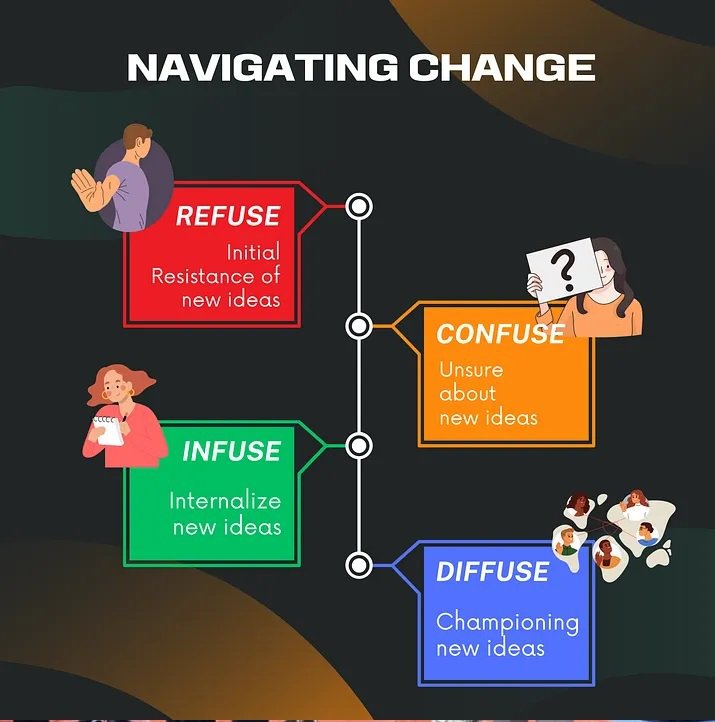
Change, especially when it challenges established norms, often meets resistance. The initial response is usually dismissive: “We don’t need this”, “This won’t work”, or “It’s impractical.” Such scepticism often stems from deeply held convictions, fear of disruption, doubts about the change’s credibility, or a lack of trust in those proposing it. Yet over time, ideas once firmly rejected can slowly gain acceptance. This shift plays out across many areas of life, from personal relationships to organisations and broader social norms. These shifts in perspective are not anomalies but reflections of evolving individual and societal attitudes. Whether within an organisational culture or the context of social reforms, the journey from rejection to acceptance tends to follow familiar patterns. Despite differing motivations — from inner convictions to external pressures — the process of change usually unfolds in four stages: refuse, confuse, infuse, and diffuse.
REFUSAL is often the first stage in the change process, where individuals reject new ideas. The greatest challenge at this stage lies in unlearning and the willingness to relearn. Stepping out of one’s comfort zone to question long-held beliefs can be difficult. Refusal may take many forms — from passive disinterest to active resistance. Yet within this resistance lie the seeds of transformation, ready to take root if change is approached in the right way. It’s important to recognise that resistance to change is not innate. More often, it’s not the change itself that people resist, but the perceived or real loss that comes with it. By addressing these concerns with empathy, transparent communication, and meaningful involvement, fears can be eased and trust built. When individuals begin to see the value in change, they become far more open to embracing new possibilities.
CONFUSION is a pivotal stage in the change process, signaling a softening of initial resistance and a growing openness to new ideas. Human curiosity often propels people into unfamiliar territory, even amid hesitation. As individuals begin to explore unfamiliar perspectives, they often experience internal conflict between old beliefs and emerging understandings. While this state of uncertainty can be uncomfortable, it is not inherently negative. Rather, it marks the beginning of meaningful transformation. Confusion reflects a willingness to question assumptions and engage in discovery. During this phase, timely support, clear communication, and empathetic guidance are essential to help individuals navigate their doubts. If left unaddressed, prolonged confusion can lead to frustration and a return to resistance, making future change efforts more difficult. By recognising confusion as a natural step in the process and actively helping individuals work through it, we lay the groundwork for lasting acceptance.
The next stage is INFUSE, where people move beyond acceptance and fully internalise new ideas, integrating them into their beliefs and behaviours. As they begin to see tangible benefits, their engagement deepens, often turning them into advocates who actively promote the value of change for others. For this stage to be meaningful, however, the transition must be authentic – rooted in real understanding and personal conviction. At times, individuals may appear to adopt new ideas, but only on the surface, driven by social pressure, a desire to conform, or to appear politically correct. This superficial buy-in, characterised more by lip service than genuine conviction, can erode trust and weaken change efforts. Therefore, fostering genuine understanding and belief is essential to ensure that the infusion of new ideas is not merely superficial but deeply ingrained in individuals’ values and actions.
DIFFUSE is the stage where individuals actively advocate and disseminate new ideas, drawing from personal conviction and lived experience. Effective diffusion, however, relies on genuine internalisation of these ideas. When people attempt to promote change without fully understanding or believing in it, they risk creating confusion and even reigniting resistance. This problem worsens when individuals only pay lip service to the ideas they promote, lacking genuine conviction. Entrusting such individuals with leading the change process can be counterproductive. For example, a leader who fails to embody the values they promote is unlikely to inspire trust or motivate others. To ensure the integrity and effectiveness of change, it is essential that those promoting new ideas genuinely understand, believe in, and embody what they advocate, ensuring their message is both credible and compelling.
The recent shift toward remote work illustrates how organisations have undergone various stages of change. Initially, many resisted the idea, questioning its feasibility and impact on productivity. However, the COVID-19 pandemic forced a rapid transition, triggering a period of confusion as organisations scrambled to adapt to new technologies and communication methods. Over time, the benefits of increased flexibility and reduced commuting became apparent, leading to the gradual integration of remote work into standard practices. Today, many organisations have adopted remote or hybrid models, and there is growing advocacy for this approach.
Another example at the policy level is renewable energy. Initially, there was scepticism towards renewable energy sources due to concerns about scalability, cost, and reliability. As technologies improved and adoption increased, confusion arose about integrating these sources into existing energy grids. With continued investment and the observed benefits of reduced emissions and energy costs, renewable energy has gained widespread acceptance. Now, governments and corporations actively promote renewable energy, highlighting its advantages.
Navigating the complexity of change requires patience, persistence, and genuine engagement. Resistance should be expected as a natural reaction to the unfamiliar, even as some individuals remain open to new ideas. Confronting challenges head-on, rather than avoiding them, is crucial. Quick fixes without deep understanding often only prolong issues. By engaging people meaningfully, addressing their concerns with empathy, and fostering true understanding, we nurture champions who drive lasting transformation. These champions, living the principles they advocate, become powerful inspirations and catalysts for change.
Pradhan is currently the Country Director of Helvetas Nepal. These are his personal opinions and do not necessarily represent the views of his organization. The article is still relevant and it is adapted from his blog in Medium https://medium.com/@maneesh.pradhan/navigating-change-from-skepticism-to-support-21b926e1d1ac














